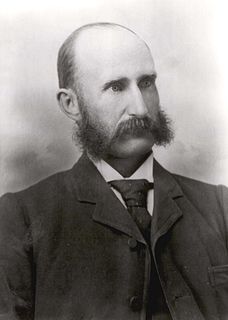Related Research Articles
Nonpartisan democracy is a system of representative government or organization such that universal and periodic elections take place without reference to political parties. Sometimes electioneering and even speaking about candidates may be discouraged, so as not to prejudice others' decisions or create a contentious atmosphere.
Liberal-Progressive was a label used by a number of candidates in Canadian elections between 1925 and 1953. In federal and Ontario politics, there was no Liberal-Progressive party: it was an alliance between two parties. In Manitoba, a party existed with this name.

Medicine Hat was a provincial electoral district in Alberta, Canada, mandated to return members to the Legislative Assembly of Alberta from 1905 to 1971, and again from 1979 to 2019. The electoral district was named after the City of Medicine Hat.

The 1909 Alberta general election was the second general election held in the Province of Alberta, Canada on March 22, 1909, to elect 41 members of the Alberta legislature to the 2nd Alberta Legislature.

The 1920 British Columbia general election was the fifteenth general election for the Province of British Columbia, Canada. It was held to elect members of the Legislative Assembly of British Columbia. The election was called on October 23, 1920, and held on December 1, 1920. The new legislature met for the first time on February 8, 1921.

Calgary was a provincial electoral district in Alberta, Canada, mandated to return one to six members to the Legislative Assembly of Alberta from 1905 to 1913, and again from 1921 to 1959. The district largely encompassed the boundaries of the City of Calgary, and was revised accordingly as the city grew.
Victoria was one of the original 25 provincial electoral districts in Alberta, named for Fort Victoria on the North Saskatchewan River. It was mandated to return a single member to the Legislative Assembly of Alberta by the first past the post method until 1917, and by instant-runoff voting from 1926 until it was abolished in 1940.
Athabasca was a provincial electoral district in Alberta, Canada, mandated to return a single member to the Legislative Assembly of Alberta from 1905 to 1986.
The 1888 North-West Territories general election was the first general election in the history of the North-West Territories, Canada. Elections were held in various districts between 20 June and 30 June 1888. This was the only general election, where the writs were issued to return on various days.

Inuvik Boot Lake is a territorial electoral district for the Legislative Assembly of the Northwest Territories, Canada.

The 1904 Prince Edward Island general election was held in the Canadian province of Prince Edward Island on December 7, 1904.
Calgary was a territorial electoral district for the Legislative Assembly of Northwest Territories, Canada.
James L. Antoine is a former politician from the Northwest Territories, Canada. He served as a member of the Legislative Assembly of the Northwest Territories from 1991 to 2003. During his time in office he led the Northwest Territories government as the eighth premier of the Northwest Territories from 1998 to 2000. He has also served as Chief of the Liidlii Kue First Nation on four occasions from the 1970s to present.

The 2007 Northwest Territories general election took place on October 1, 2007. Nineteen members were elected to the Legislative Assembly from single member districts conducted under first-past-the-post voting system.

The 1892 Edmonton municipal election, held February 10, 1892, was the first after the incorporation of Edmonton as a town in the North-West Territories on January 9, 1892, and was held to elect the new town's first town council for a one-year term. It saw Matthew McCauley acclaimed as Edmonton's first mayor, and elected Colin Strang, Daniel Fraser, Edward Carey, James Goodridge, John Cameron, and Philip Daly from a field of fourteen candidates for aldermen.

Floyd K. Roland, MLA is a politician from Northwest Territories, Canada. He was the 11th premier of the Northwest Territories, having held office from October 17, 2007 to October 26, 2011.
Michael McLeod is a Canadian politician, currently serving as a member of Parliament representing the Northwest Territories. He was first elected in the 2015 Canadian federal election, unseating Dennis Bevington, who was the incumbent New Democratic Party MP for the riding. McLeod was a former member of the Legislative Assembly of the Northwest Territories, Canada, as well as the former mayor of Fort Providence.
John Pollard is a businessman and former politician from Hay River, Northwest Territories, Canada. He was a Member of the Legislative Assembly of the Northwest Territories from 1987 until 1995, serving as Minister of Finance.

John Lineham was a territorial-level politician and businessman from Northwest Territories, Canada.
The 1st Legislative Assembly of British Columbia sat from 1871 to 1875. The members were elected in the British Columbia general election held in October 1871. John Foster McCreight was called upon to form a cabinet. In December 1872, the government was defeated on a confidence motion and Amor De Cosmos subsequently formed a new cabinet. After De Cosmos was elected to the House of Commons in February 1874, George A. Walken became premier.
References
- ↑ Robert, Henry M. (2011). Robert's Rules of Order Newly Revised, 11th ed., p. 443 (RONR)
- ↑ "Elected by acclamation". Electoral Results. Parliament of Canada. Archived from the original on 22 June 2008. Retrieved 2008-06-24.
- ↑ Results of the 2003 Northwest Territories election Archived 2011-07-06 at the Wayback Machine - Elections NWT. Retrieved 2010-01-11.